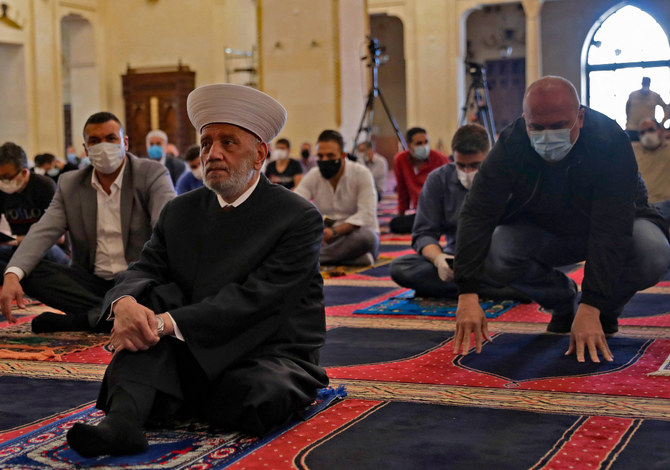BEIRUT: Lebanon’s Grand Mufti Sheikh Abdel Latif Derian warned on Saturday that Lebanon has become a failed state.
“We are rapidly moving toward no state at all, and the Arabs and the world will soon start ignoring Lebanon’s existence because of political mismanagement at all levels,” he said.
“We need to elect a new president and the MPs are responsible for electing him or creating a presidential vacuum.”
Derian had invited Sunni MPs for a meeting at Dar Al-Fatwa to discuss possible candidates.
All but three of 27 Sunni MPs from different political currents attended the meeting, including one MP affiliated with Hezbollah, in addition to reformist and independent MPs.
Two reformist MPs, Ibrahim Mneimneh and Halima Al-Qaaqour, and independent MP Osama Saad did not attend.
A source in Dar Al-Fatwa said that the meeting was aimed at uniting the Sunni bloc in parliament to allow it to have a meaningful say in the presidential elections.
The bloc also aims stop any attempts to tamper with the Taif Agreement and undermine its provisions regarding Lebanon’s constitution, the source said.
The meeting focused on efforts to preserve national unity, and respect constitutional deadlines on the election of a new president and the formation of a government capable of implementing financial, monetary and legislative reforms, including an economic recovery plan.
During the meeting, Derian said that the survival of nations and states depends on the effectiveness of their constitutional institutions.
The president is the protector of the constitution, and the Christian president in Lebanon is a symbol of coexistence on which the Lebanese system is based, he said.
Arabs “recognize and appreciate the Lebanese experience” because the Lebanese president is the only Christian president in the Arab world, Derian added.
He urged MPs to encourage respect for the president’s position, and help him assume his role at home and abroad.
Derian also said the new president must preserve the principles of the Taif Agreement, the constitution, coexistence, and Lebanon’s national, Arab and international legitimacy.
If these matters are neglected, Lebanon will be unable to maintain order, stability and its national entity, he added.
Derian highlighted the need to put an end to made-up sectarian, divisive clashes over powers and return to the constitutional principle of separating powers but maintaining cooperation between them.
He called for the election of a president characterized by the personal and political qualities of a public businessman who would be ethically responsible for the mission with which he is tasked.
The new president must have wisdom, national responsibility and integrity, as well as the ability to be inclusive of all Lebanese, and to use his powers to help the country out of this crisis and prevent it from reaching total collapse, he said.
Derian reiterated: “Either we elect a president with these qualities, or we see the regime and the state fall before our eyes.”
He also appealed for respect for the prime minister and help for the PM-designate with his mission.
“This is a joint responsibility that rests with everyone. We are looking forward to forming a government as soon as possible, perhaps in the next few days,” said Derain, adding that Lebanon needed a government with full powers — and not a caretaker government — in these harsh and difficult circumstances.
Derian said Lebanon can survive only if consensus is reached. There is no salvation without unity, away from tension, sectarian strife and incitement, he added.
Lebanon needed a president “who is not part of the problem or the cause of it.”
In a statement issued after the meeting, those present stressed the principles advocated by Dar Al-Fatwa, especially in terms of committing to the Taif Agreement, Lebanon’s Arab identity and national unity.
They also condemned the abuses that had harmed and were still harming the foundations of national reconciliation and coexistence.
The Sunni MPs stressed the need to end Lebanon’s suffering under mismanagement and rampant corruption.
“Saving Lebanon requires recognizing the mistakes that were made, holding the perpetrators accountable, whoever they are, and sincerely cooperating with the different Lebanese and Arab parties and the international community to restore Lebanon’s identity and stature,” they said.
The Sunni MPs said that they will work with fellow MPs to elect a new president on the specified constitutional date.
They said that the new president “needs to abide by the constitution and be loyal to the people of Lebanon and their interests.”
The statement added that Lebanon’s enemy was and still is the Israeli army, which continued to occupy parts of the Lebanese territories.
It called for the implementation of UN Security Council resolutions that stipulate the Israeli withdrawal from the occupied Palestinian territories and the recognition of Jerusalem as an occupied city.














